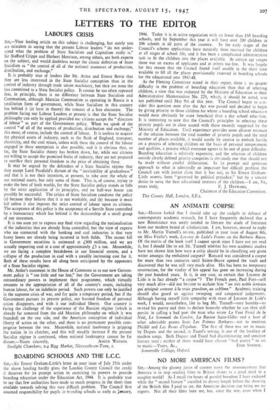LETTERS TO THE EDITOR
LABOUR'S CRISIS
Sta,—Your leading article on this subject is challenging, but surely you are mistaken in saying that the present Labour leaders " do not under- stand what the problem of State Socialism and Capitalism really is." Sir Stafford Cripps and Herbert Morrison, among others, are both experts on the subject, and would doubtless accept the classic definition of State Socialism as " the control of all of the national resources of production, distribution, and exchange."
It is probably true of leaders like Mr. Attlee and Ernest Bevin that they are less interested in the State Socialist conception than in the control of industry through trade union machinery, but they are none the less committed to a State Socialist policy. It cannot be too often repeated that, in principle, there is no difference between State Socialism and Communism, although Marxian Communism as operating in Russia is a totalitarian form of government, while State Socialism in this country has behind it (at least in theory) the consent of a free electorate. The problem facing our Labour Leaders at present is that the State Socialist philosophy can only be applied provided our citizens accept the " direction of labour " as part of the Government policy. When we speak of the control "of all of the sources of production, distribution and exchange," this must, of course, include the control of labour. It is useless to acquire the physical assets of industry, such as the Bank of England, transport, electricity, and the coal mines, unless with these the control of the labour engaged in these enterprises is also possible, and it is obvious that, so far, the State Socialist theory has broken down, for, while our citizens are willing to accept the promised fruits of industry, they are not prepared to sacrifice their personal freedom as the price of obtaining these.
It may be argued by the defenders of a State Socialist regime that they accept Lord Passfield's dictum of the " inevitability of gradualness " and that it is not their intention, at present, to take over the whole of our national assets, but only some of them. This is, of course, trying to make the best of both worlds, for the State Socialist policy stands or falls by the strict application of its *principles, and no half-way house can possibly be successful. The critics of State Socialism condemn the policy (a) because they believe that it is not workable, and (b) because it must fail unless it also imposes the strict control of labour upon its citizens. The acceptance of this policy is the acceptance of a Servile State controlled by a bureaucracy which has behind it the dictatorship of a small group of our statesmen.
It is too soon yet to express any final view regarding the nationalisation of the industries that are already State controlled, but the view of experts who are connected with the banking and coal industries is that very heavy losses are already being incurred in both fields. The recent fall in Government securities is estimated at £800 million, and we are actually importing coal at a cost of approximately £5 a ton. Meanwhile, we are facing a complete breakdown in our financial system, and a collapse of the production in coal with a steadily increasing cost for it. Both of these results have all along been anticipated by the opponents of a State Socialist regime.
Mr. Attlee's statement in the House of Commons as to our new Govern- ment policy is " too little and too late," but the Government arc taking extraordinary powers to implement their programme, which virtually amounts to the appropriation of all of the country's assets, including human labour, for an indefinite period. Such powers can only be justified in the supreme crisis of war, and for quite a temporary period, but if the Government pursues its present policy, our boasted freedom of personal action disappears, and with it our individual liberty. Our country is facing the challenge of the experience of the Russian regime (which is already far removed from the old Marxian philosophy on which it was founded) on the one side, and the American conception of individual liberty of action on the other, and there is no permanent possible com- promise between the two. Meanwhile, national insolvency is gripping the nation in its clutches, and this will steadily increase if the present Socialist regime is continued, when national bankruptcy cannot be far
distant.—Yours sincerely, ANGUS WATSON. Sunlight Chambers, 2-4 Bigg Market, Newcastle-on-Tyne, r.


































 Previous page
Previous page